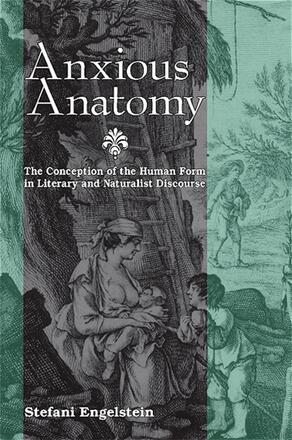
Anxious Anatomy
The Conception of the Human Form in Literary and Naturalist Discourse
Examines the body in literature and science in late eighteenth- and early nineteenth-century Europe.
Description
In Anxious Anatomy, Stefani Engelstein reconstructs the late eighteenth- and early nineteenth-century human body to offer startling new readings of major works by Goethe, Blake, Heinrich von Kleist, E. T. A. Hoffmann, Mary Shelley, and Jane Austen. Engelstein links research on reproduction both to the ability of organisms such as hydra, snails, and newts to replace severed heads and gouged out eyes, and also to technical advances in battlefield amputation and artificial limbs. Readings of German and British literature, alongside natural history, surgery, aesthetics, and art, illuminate the importance of investigations into the body for emerging theories of human subjectivity, gender, volition, ethical behavior, and political organization. Engelstein also demonstrates how attempts to explain the structural characteristics of the body developed into biological justifications for ideologies of race, gender, and social hierarchies.
Stefani Engelstein is Associate Professor of German at the University of Missouri.
Reviews
"…Engelstein's study succeeds in inspiring readers to revisit these great literary works … humanities graduate students and faculty with a focus on the natural sciences will find it fascinating. " — German Studies Review
"Engelstein draws upon the developing disciplines of natural science (including philosophy), medical illustration, and aesthetics and traces the process that created the norm for the human form. " — Studies in English Literature
"Engagingly written and impressively grounded in primary sources, the study offers startlingly fresh readings even of works that have inspired abundant scholarship. " — CHOICE
"Stefani Engelstein's Anxious Anatomy presents a selection of European fantasies about the meanings of bodies and their fragility. Careful research in the medical and cultural discourses frames her readings of literary texts in ways that provide startling and original insights into the creative reframing of what the body was taken to mean in the nineteenth-century Western literary fantasy—where many of our stereotypes of what our own body is and can become originate. Brilliantly illustrated; extraordinarily accessible. " — Sander L. Gilman, Director of the Health Sciences Humanities Program, Emory University
"Anxious Anatomy contributes forcefully to a growing critical interest in the history of the human body and its political implications. Participating directly in the materialist shift that is reshaping criticism in studies of Romantic literature, the book urges a reassessment of naturalist and literary discourse from the perspective of the anatomies they help construct. " — Paul Youngquist, author of Monstrosities: Bodies and British Romanticism
"This is an erudite, engaging, and also very entertaining book. It makes a very convincing case that literature and science functioned as separate but interdependent fields. " — Carl Niekerk, University of Illinois at Urbana-Champaign
"Engelstein's study of anatomy and the human form moves masterfully between science and literature, without reducing one discipline to the other. Engelstein is one of the rare critics who can comfortably and lucidly explain the history of biology to a literary audience. Her arguments resonate well beyond the immediate confines of the Romantic era. " — Daniel Purdy, author of The Tyranny of Elegance: Consumer Cosmopolitanism in the Era of Goethe